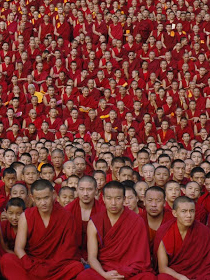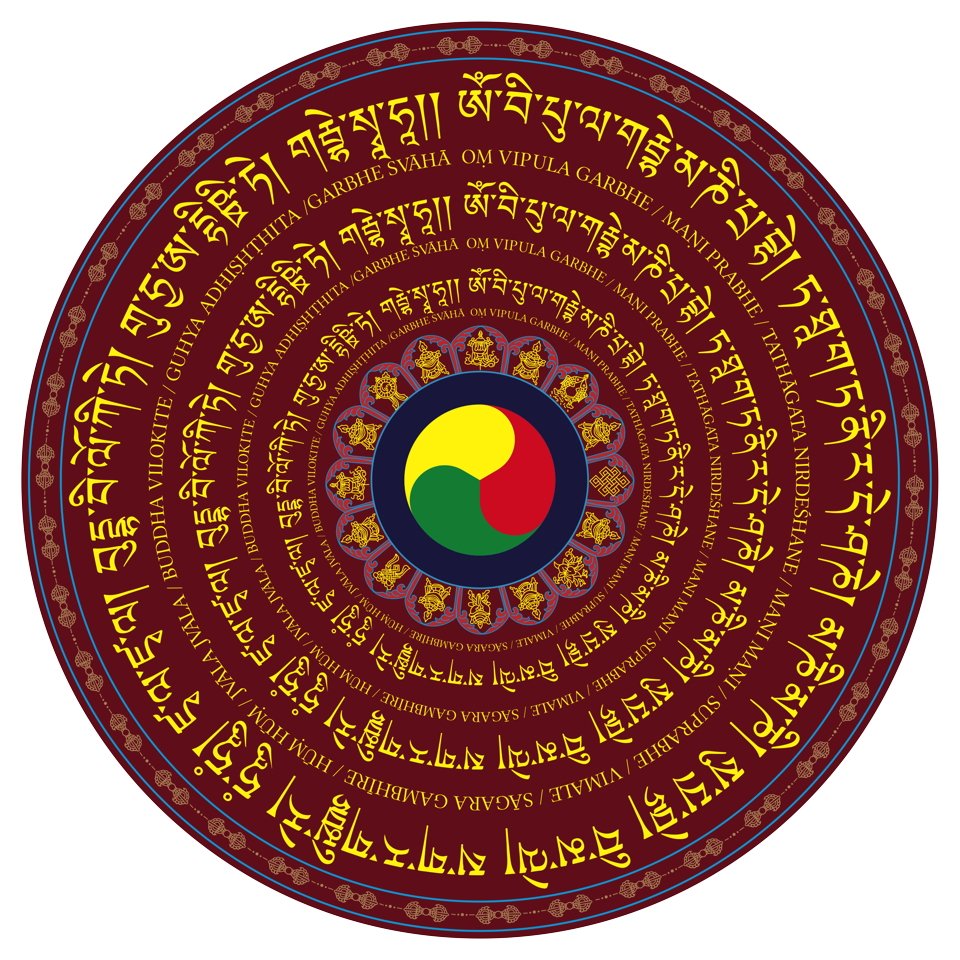- Home
- FPMT Homepage
Foundation for the Preservation of the Mahayana Tradition
The FPMT is an organization devoted to preserving and spreading Mahayana Buddhism worldwide by creating opportunities to listen, reflect, meditate, practice and actualize the unmistaken teachings of the Buddha and based on that experience spreading the Dharma to sentient beings. We provide integrated education through which people’s minds and hearts can be transformed into their highest potential for the benefit of others, inspired by an attitude of universal responsibility and service. We are committed to creating harmonious environments and helping all beings develop their full potential of infinite wisdom and compassion. Our organization is based on the Buddhist tradition of Lama Tsongkhapa of Tibet as taught to us by our founders Lama Thubten Yeshe and Lama Thubten Zopa Rinpoche.
- Willkommen
Die Stiftung zur Erhaltung der Mahayana Tradition (FPMT) ist eine Organisation, die sich weltweit für die Erhaltung und Verbreitung des Mahayana-Buddhismus einsetzt, indem sie Möglichkeiten schafft, den makellosen Lehren des Buddha zuzuhören, über sie zur reflektieren und zu meditieren und auf der Grundlage dieser Erfahrung das Dharma unter den Lebewesen zu verbreiten.
Wir bieten integrierte Schulungswege an, durch denen der Geist und das Herz der Menschen in ihr höchstes Potential verwandelt werden zum Wohl der anderen – inspiriert durch eine Haltung der universellen Verantwortung und dem Wunsch zu dienen. Wir haben uns verpflichtet, harmonische Umgebungen zu schaffen und allen Wesen zu helfen, ihr volles Potenzial unendlicher Weisheit und grenzenlosen Mitgefühls zu verwirklichen.
Unsere Organisation basiert auf der buddhistischen Tradition von Lama Tsongkhapa von Tibet, so wie sie uns von unseren Gründern Lama Thubten Yeshe und Lama Thubten Zopa Rinpoche gelehrt wird.
- Bienvenidos
La Fundación para la preservación de la tradición Mahayana (FPMT) es una organización que se dedica a preservar y difundir el budismo Mahayana en todo el mundo, creando oportunidades para escuchar, reflexionar, meditar, practicar y actualizar las enseñanzas inconfundibles de Buda y en base a esa experiencia difundir el Dharma a los seres.
Proporcionamos una educación integrada a través de la cual las mentes y los corazones de las personas se pueden transformar en su mayor potencial para el beneficio de los demás, inspirados por una actitud de responsabilidad y servicio universales. Estamos comprometidos a crear ambientes armoniosos y ayudar a todos los seres a desarrollar todo su potencial de infinita sabiduría y compasión.
Nuestra organización se basa en la tradición budista de Lama Tsongkhapa del Tíbet como nos lo enseñaron nuestros fundadores Lama Thubten Yeshe y Lama Zopa Rinpoche.
A continuación puede ver una lista de los centros y sus páginas web en su lengua preferida.
- Bienvenue
L’organisation de la FPMT a pour vocation la préservation et la diffusion du bouddhisme du mahayana dans le monde entier. Elle offre l’opportunité d’écouter, de réfléchir, de méditer, de pratiquer et de réaliser les enseignements excellents du Bouddha, pour ensuite transmettre le Dharma à tous les êtres. Nous proposons une formation intégrée grâce à laquelle le cœur et l’esprit de chacun peuvent accomplir leur potentiel le plus élevé pour le bien d’autrui, inspirés par le sens du service et une responsabilité universelle. Nous nous engageons à créer un environnement harmonieux et à aider tous les êtres à épanouir leur potentiel illimité de compassion et de sagesse. Notre organisation s’appuie sur la tradition guéloukpa de Lama Tsongkhapa du Tibet, telle qu’elle a été enseignée par nos fondateurs Lama Thoubtèn Yéshé et Lama Zopa Rinpoché.
Visitez le site de notre Editions Mahayana pour les traductions, conseils et nouvelles du Bureau international en français.
Voici une liste de centres et de leurs sites dans votre langue préférée
- Benvenuto
L’FPMT è un organizzazione il cui scopo è preservare e diffondere il Buddhismo Mahayana nel mondo, creando occasioni di ascolto, riflessione, meditazione e pratica dei perfetti insegnamenti del Buddha, al fine di attualizzare e diffondere il Dharma fra tutti gli esseri senzienti.
Offriamo un’educazione integrata, che può trasformare la mente e i cuori delle persone nel loro massimo potenziale, per il beneficio di tutti gli esseri, ispirati da un’attitudine di responsabilità universale e di servizio.
Il nostro obiettivo è quello di creare contesti armoniosi e aiutare tutti gli esseri a sviluppare in modo completo le proprie potenzialità di infinita saggezza e compassione.
La nostra organizzazione si basa sulla tradizione buddhista di Lama Tsongkhapa del Tibet, così come ci è stata insegnata dai nostri fondatori Lama Thubten Yeshe e Lama Zopa Rinpoche.
Di seguito potete trovare un elenco dei centri e dei loro siti nella lingua da voi prescelta.
- 欢迎 / 歡迎
简体中文
“护持大乘法脉基金会”( 英文简称:FPMT。全名:Foundation for the Preservation of the Mahayana Tradition) 是一个致力于护持和弘扬大乘佛法的国际佛教组织。我们提供听闻,思维,禅修,修行和实证佛陀无误教法的机会,以便让一切众生都能够享受佛法的指引和滋润。
我们全力创造和谐融洽的环境, 为人们提供解行并重的完整佛法教育,以便启发内在的环宇悲心及责任心,并开发内心所蕴藏的巨大潜能 — 无限的智慧与悲心 — 以便利益和服务一切有情。
FPMT的创办人是图腾耶喜喇嘛和喇嘛梭巴仁波切。我们所修习的是由两位上师所教导的,西藏喀巴大师的佛法传承。
繁體中文
護持大乘法脈基金會”( 英文簡稱:FPMT。全名:Found
ation for the Preservation of the Mahayana Tradition ) 是一個致力於護持和弘揚大乘佛法的國際佛教組織。我們提供聽聞, 思維,禪修,修行和實證佛陀無誤教法的機會,以便讓一切眾生都能 夠享受佛法的指引和滋潤。 我們全力創造和諧融洽的環境,
為人們提供解行並重的完整佛法教育,以便啟發內在的環宇悲心及責 任心,並開發內心所蘊藏的巨大潛能 — 無限的智慧與悲心 – – 以便利益和服務一切有情。 FPMT的創辦人是圖騰耶喜喇嘛和喇嘛梭巴仁波切。
我們所修習的是由兩位上師所教導的,西藏喀巴大師的佛法傳承。 察看道场信息:
- FPMT Homepage
- News/Media
-
- Study & Practice
-
-
- About FPMT Education Services
- Latest News
- Programs
- New to Buddhism?
- Buddhist Mind Science: Activating Your Potential
- Heart Advice for Death and Dying
- Discovering Buddhism
- Living in the Path
- Exploring Buddhism
- FPMT Basic Program
- FPMT Masters Program
- FPMT In-Depth Meditation Training
- Maitripa College
- Lotsawa Rinchen Zangpo Translator Program
- Universal Education for Compassion & Wisdom
- Online Learning Center
-
- Prayers & Practice Materials
- Overview of Prayers & Practices
- Full Catalogue of Prayers & Practice Materials
- Explore Popular Topics
- Benefiting Animals
- Chenrezig Resources
- Death & Dying Resources
- Lama Chopa (Guru Puja)
- Lama Zopa Rinpoche: Compendium of Precious Instructions
- Lama Zopa Rinpoche: Life Practice Advice
- Lama Zopa Rinpoche Practice Series
- Lamrim Resources
- Mantras
- Prayer Book Updates
- Purification Practices
- Sutras
- Thought Transformation (Lojong)
- Audio Materials
- Dharma Dates - Tibetan Calendar
- Translation Services
- Publishing Services
- Ways to Offer Support
- Prayers & Practice Materials
-
- Teachings and Advice
- Find Teachings and Advice
- Lama Zopa Rinpoche Advice Page
- Lama Zopa Rinpoche: Compendium of Precious Instructions
- Lama Zopa Rinpoche Video Teachings
- ༧སྐྱབས་རྗེ་བཟོད་པ་རིན་པོ་ཆེ་མཆོག་ནས་སྩལ་བའི་བཀའ་སློབ་བརྙན་འཕྲིན།
- Podcasts
- Lama Yeshe Wisdom Archive
- Buddhism FAQ
- Dharma for Young People
- Resources on Holy Objects
- Teachings and Advice
-
-
*If a menu item has a submenu clicking once will expand the menu clicking twice will open the page.
-
-
- Centers
-
- Teachers
-
- Projects
-
-
-
-
*If a menu item has a submenu clicking once will expand the menu clicking twice will open the page.
-
-
- FPMT
-
-
-
-
-
The workshop is in the mind.
Lama Zopa Rinpoche
-
-
-
- Shop
-
-
-
The Foundation Store is FPMT’s online shop and features a vast selection of Buddhist study and practice materials written or recommended by our lineage gurus. These items include homestudy programs, prayers and practices in PDF or eBook format, materials for children, and other resources to support practitioners.
Items displayed in the shop are made available for Dharma practice and educational purposes, and never for the purpose of profiting from their sale. Please read FPMT Foundation Store Policy Regarding Dharma Items for more information.
-
-
Study & Practice News
3
Manifest the Love of All the Buddhas
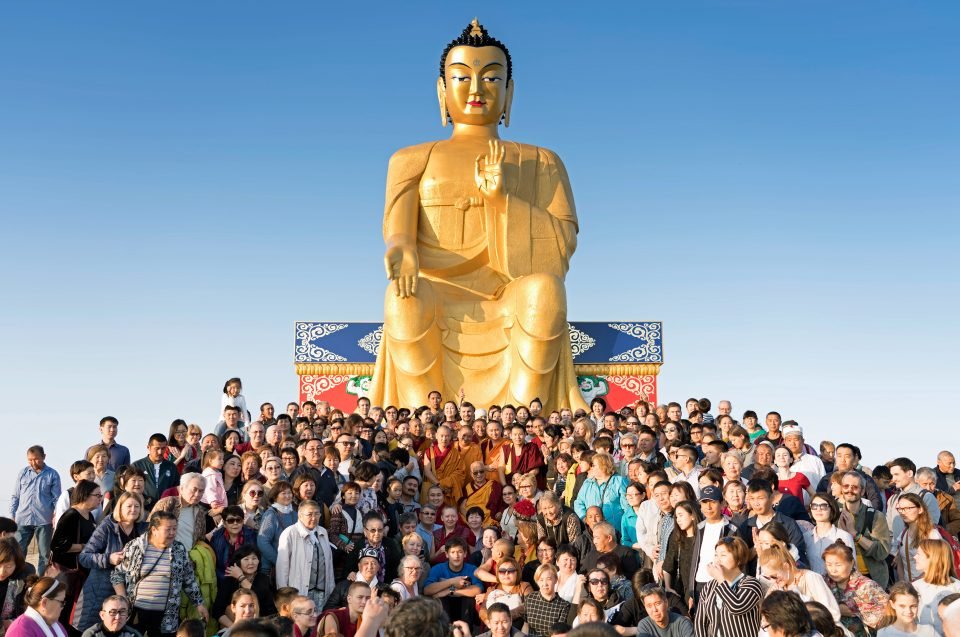
Lama Zopa Rinpoche with group in front of the large Maitreya Buddha statue in Lagan, Kalmykia, Russia, 2019. Photo by Ven. Lobsang Sherab.
“Love and compassion are necessities, not luxuries. Without them, humanity cannot survive,” His Holiness the Dalai Lama says in his book The Art of Happiness. As students of Dharma know, love and compassion are essential to Buddhist practice. When we think about bringing more love into the world and into our practice, we can think about the Maitreya Buddha.
Lama Yeshe, who founded FPMT with Lama Zopa Rinpoche, taught on the yoga method of Maitreya Buddha at Maitreya Instituut, the FPMT center in the Netherlands, in 1981. These teachings were collected in the book Universal Love: The Yoga Method of Buddha Maitreya. In it, Lama Yeshe says, “Maitreya is the manifestation of the love of all the buddhas—the supreme beings who have achieved limitless, universal love.”
So, who is Maitreya Buddha? Chapter 4 of Universal Love shares the following:
“Countless eons ago, having made many offerings, Maitreya took bodhisattva vows from the Tathagata Great Power in front of many other buddhas. From that moment on he has led countless sentient beings to enlightenment, guiding them along the path of the three higher trainings of discipline, concentration, and wisdom by means of the three vehicles: Shravakayana, Pratyekabuddhayana, and Mahayana.
“While practicing as a bodhisattva he specialized in the meditation on great love. He not only taught this path to others but also meditated upon it continuously himself, often stationing himself at the gate of a city and contemplating deeply on loving kindness. His meditation was so powerful that people passing by close enough to touch his feet would themselves receive the realization of great love. This greatly pleased the tathagatas of the ten directions, who rejoiced in his actions and predicted that in all his future lives as a bodhisattva and a buddha he would be known as ‘Love’ [Skt: Maitreya; Tib: Jampa]. This is how he received his name. …
“In the absolute sense Maitreya is subject to neither death nor rebirth; he is forever benefiting all mother sentient beings. Furthermore, he once declared, ‘Anybody keeping just one vow of moral discipline purely during the time of Shakyamuni Buddha’s teachings will become my personal disciple when I appear and I shall liberate all such disciples,’ and he faithfully keeps this promise, his sworn oath and pledge.
“Therefore, those of us fortunate enough to have met the teachings of Shakyamuni Buddha and maintained some level of pure discipline are guaranteed to make direct contact with Maitreya, become his disciple and quickly achieve enlightenment.”
If you would like to include Maitreya Buddha in your practice, the Foundation Store offers the Arya Maitreya’s Promise Dharani PDF and an audio recording of Lama Zopa Rinpoche reciting this dharani.
Rinpoche has explained the benefits of reciting this dharani as follows:
- By listening and reciting the mantra daily, and reflecting and meditating on the meaning, one will not be reborn in the lower realms. Even if an animal hears the mantra, it does not get reborn in the lower realms.
- One will be reborn as a Wheel-Turning King for thousands of lives with a lifespan lasting thousands of eons of devas’ lifespans.
- One is able to engage and live in the path of the ten virtues.
- One receives all the enjoyments one is looking for.
- Maitreya Buddha will never let this sentient being suffer poverty and so forth.
- Even when a sentient being is in hell, Maitreya Buddha will definitely come and look for it and will give the prediction of enlightenment by causing the being to reincarnate in the human realm.
You can read Rinpoche discussing the benefits of reciting the Maitreya Buddha mantra during a teaching in Bodhgaya, India, in 2006.
Additional materials related to Universal Love are available on the Lama Yeshe Wisdom Archive.
You can find a full catalogue of FPMT prayers, practices, and advice materials on FPMT.org.
Through comprehensive study programs, practice materials, and training seminars, FPMT Education nourishes the development of compassion, wisdom, kindness, and true happiness in individuals of all ages.
- Tagged: dharani, lama yeshe, maitreya buddha
24
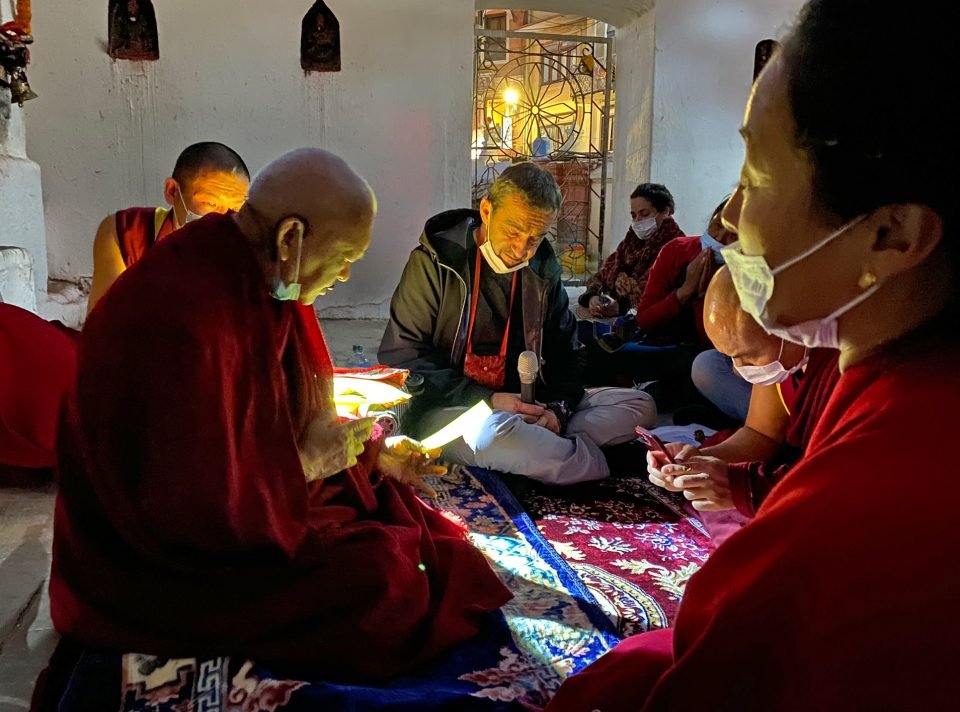
Lama Zopa Rinpoche giving a teaching at Boudha Stupa with Khadro-la, followed by taking Bodhisattva Vows, Nepal, December 2021. Photo by Ven. Roger Kunsang.
The international FPMT mandala spans more than thirty countries around the world. To meet the study and practice needs of our non-English speaking students, many practice resources, texts, study programs, and teachings from Lama Zopa Rinpoche are made available in a variety of languages. Here’s a summary of the resources available through FPMT.org, the Foundation Store, and the Online Learning Center.
Practice Materials in Different Languages
FPMT’s Foundation Store offers hundreds of Dharma practice resources that have been translated into various languages in addition to English. Common FPMT prayers and practices have been translated into Spanish, French, Italian, German, Vietnamese, Tibetan, Chinese, and other languages.
Students can also find online FPMT Education programs in French and Spanish.
Many of these materials and programs have been translated by FPMT students working with language specific translation groups and publishing houses. (Find links to FPMT translation houses.)
Teachings by Lama Zopa Rinpoche in Translation
Students can watch hundreds of hours of video teachings by Lama Zopa Rinpoche, which have been translated into several languages by dedicated volunteer interpreters:
- The Thought Transformation Teachings videos from 2021 have been translated into Chinese, French, Italian, and Spanish. Audio files of these translations are also available.
- The Thought Transformation Teaching videos from 2020 have been translated into Chinese, French, Italian, Portuguese, Spanish, and Russian. There are also audio files for French, Italian, and Spanish.
- Many other teaching events with Rinpoche have been translated and are available on our Rinpoche Available Now video pages. Check each event’s page to see what languages are available.
Teachings in Tibetan
An exciting opportunity for Tibetan speakers began this year as Rinpoche started offering video teachings in Tibetan. About twenty videos have been recorded. A few practices, some created by Rinpoche, were made available in Tibetan.
You can find a full catalogue of FPMT prayers, practices, and advice materials on FPMT.org.
Find materials in various language in the Foundation Store:
https://shop.fpmt.org/Other-Languages_c_385.html
Through comprehensive study programs, practice materials, and training seminars, FPMT Education nourishes the development of compassion, wisdom, kindness, and true happiness in individuals of all ages.
13

Pechas at Lawudo Gompa, Nepal, 2019. Photo by Harald Weichhart.
In order to make it easier for FPMT students to find prayers and practice materials, we’ve created a new page: “Full Catalogue of Prayers and Practices.” From this page, you can find a collection of all FPMT Education Services prayers, practices, and advice materials that are available as downloadable PDFs, ebooks, and audio MP3s.
This collection is organized into the following categories:
- Deity Practices & Prayers
- Other Prayers & Practices
- Mantras & Holy Names
- Sutras & Dharani
- Teachings, Advice & Commentaries
- Other Texts & Translations
- Pilgrimage Manuals
You can find these additional materials and resources on our new catalogue page:
- Printable images of deities, mantras, protection items, Dharma verses, and quotations
- Audio recordings of Buddhist teachings, chants, meditations, supplementary materials for study programs, and more
- Link to our microfilm resources page, which has information about mantras on microfilm and how to acquire them for filling stupas and prayer wheels.
Most materials can be ordered through the Foundation Store by donation, which goes toward supporting our future Dharma publications.
FPMT Education Services has also been making more practice materials and prayers available as ebooks. In addition, editors are regularly updating existing materials based on advice from Rinpoche and to ensure consistency across our publications. You can use these links to find all new arrivals and updated materials available on our Foundation Store.
We encourage you to visit our new “Full Catalogue of Prayers and Practices” page and bookmark it for your practice needs:
https://fpmt.org/education/prayers-and-practice-materials/full-catalogue/
Please visit our Licensing page if you have questions about our distribution, licensing, and copyright guidelines.
Through comprehensive study programs, practice materials, and training seminars, FPMT Education nourishes the development of compassion, wisdom, kindness, and true happiness in individuals of all ages.
- Tagged: prayers
21
Lama Tsongkhapa Day (Ganden Ngamchoe) Is on December 29
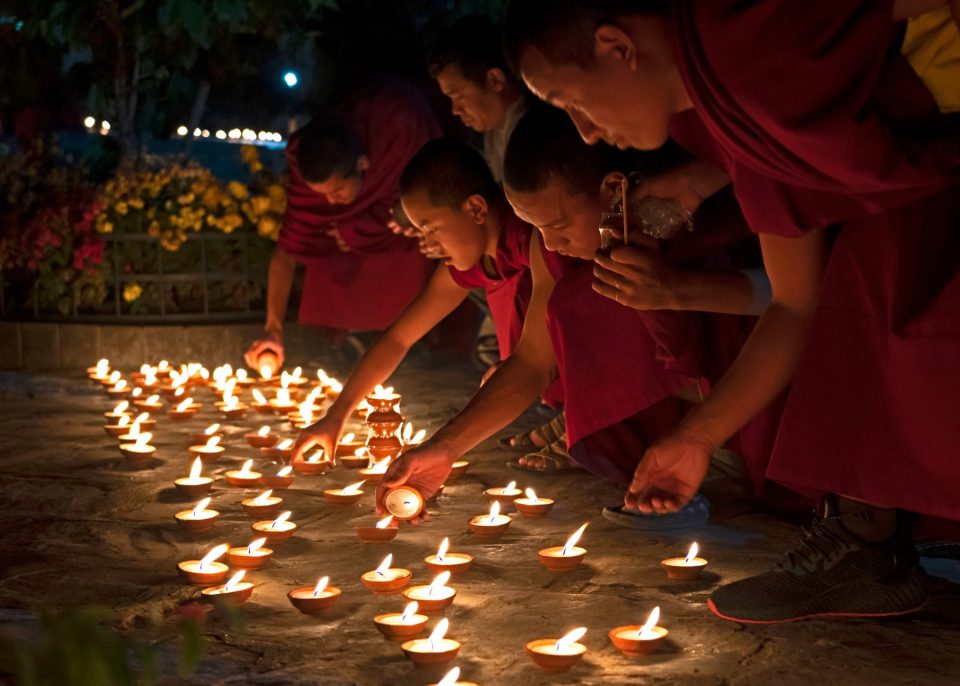
Monks making light offerings at Kopan Monastery in Nepal on Lama Tsongkhapa Day, December 2020. Photo by Ven. Lobsang Sherab.
Ganden Ngamchoe, literally “Ganden Offering of the Twenty-Fifth Day,” is also known as Lama Tsongkhapa Day. It is a celebration of the anniversary of the parinirvana of Lama Tsongkhapa (1357-1419), the founder of the Gelug tradition of Tibetan Buddhism. This auspicious and holy day is celebrated on the twenty-fifth day of the tenth month of the Tibetan calendar, which is December 29 this year.
Lama Zopa Rinpoche encourages FPMT students to engage in a variety of practices on Ganden Ngamchoe to celebrate and create merit, including making light offerings. While at Kopan Monastery last year on Lama Tsongkhapa Day, Rinpoche said, “Light offering is very important, in particular, by making light offerings you are able to dispel the darkness of ignorance and develop Dharma wisdom. Any light offering can dispel darkness, it doesn’t have to be just a butter lamp. You can offer electric lights and even the sun.”
Many FMPT centers are offering celebrations on Lama Tsongkhapa Day, both on site and online. For students unable to attend a celebration at an FPMT center or join an online celebration, the main practice recommended by Lama Zopa Rinpoche is Lama Chopa with extensive light offerings if possible. If one is unable to arrange Lama Chopa, Lama Tsongkhapa Guru Yoga is also recommended. In addition, recitation of any or all of the Lama Tsongkhapa-related prayers and texts is encouraged.
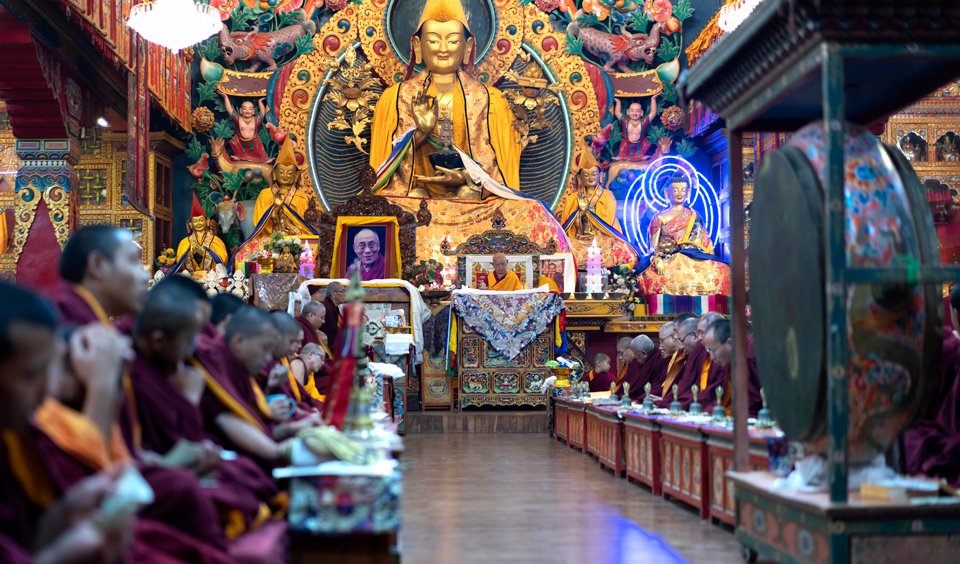
Puja at Kopan Monastery on Lama Tsongkhapa Day, Nepal, December 2020. Photo by Ven. Lobsang Sherab.
Rinpoche has also given detailed advice about practices to do at FPMT centers, projects, and services. Please see the page “Practices for Ganden Ngamchoe, Lama Tsongkhapa Day” for details on these practices. Here are some of the prayers and practices recommended by Rinpoche for a celebration of Lama Tsongkhapa Day, which can also be done by students as they are able:
English
- 1000 Offerings to Lama Tsongkhapa
- Extensive Offering Practice
- The Glorious One of the Three Worlds (Päl dän sa sum ma)
- A Hymn of Experience
- Destiny Fulfilled
- Prayer for the Flourishing of Tsongkhapa’s Teachings
- Lama Tsongkhapa’s Secret Biography
- Dependent Arising: A Praise to the Buddha
Tibetan
- The Thousand Offerings to Lama Tsongkhapa
- Päl dän sa sum ma (The Glorious One of the Three Worlds)
- Lama Tsongkhapa’s Secret Biography
French materials, including “Prière pour le développement de Lama Tsongkhapa” and “Hymne au Bouddha Shakyamouni pour son enseignement sur la production dépendante,” are available through Les Éditions Mahayana. You can also find more practice materials related to Lama Tsongkhapa, including practices in Spanish and other languages, in the Foundation Store.
* In accordance with the advice of Ven. Choden Rinpoche, one of Lama Zopa Rinpoche’s teachers, Lama Zopa Rinpoche observes all the auspicious dates in the Buddhist calendar by Indian Standard time, instead of any other local time.
You can read more about Lama Tsongkhapa Day and find a full catalogue of FPMT prayers, practices, and advice materials on FPMT.org.
Through comprehensive study programs, practice materials, and training seminars, FPMT Education nourishes the development of compassion, wisdom, kindness, and true happiness in individuals of all ages.
- Tagged: lama tsongkhapa day
16
Liberation Tibetan Calendar for 2022 Available Now!
This calendar for 2022, the year of the Water Tiger 2149, is available as a PDF from the Foundation Store. It includes lunar dates, dates for merit multiplying days, and information about more than thirty kinds of practice days as well as the auspicious and inauspicious days for each month. The calendar is an invaluable tool for supporting your Dharma practice and helping it become most beneficial.
The calendar was prepared by astrologer Paksam Ngawang Thartho based on the Tibetan Medical and Astrological Institute’s calendar, with additional advice from Lama Zopa Rinpoche and Geshe Ngawang Dakpa.
By ordering this digital format calendar, you are directly supporting the Liberation Prison Project, an FPMT project that works with Dharma students in prison.
Find the 2022 Liberation Tibetan Calendar PDF at the Foundation Store:
https://shop.fpmt.org/2022-Liberation-Tibetan-Calendar-PDF-Dowloadable-Format-_p_3641.html
- Tagged: tibetan calendar
3
Printable Cards and Posters in the Foundation Store

Lama Yeshe and Lama Zopa Rinpoche at Lawudo, Nepal, 1969
FPMT’s Foundation Store offers more than fifty cards and posters suitable for printing.
These images are made available as high quality PDFs that can be printed as cards for your home and altar. Many of these images have been created on the advice of Lama Zopa Rinpoche to offer protection and purification. Here are a few examples:
- Lama Atisha Protection Mantra
- Powerful Mantras for the Body at Death Time
- Phagpa Chulung Rolpai Do Mantra and Six Syllables of Clairvoyance Mantra
- Thang Thong Gyalpo Earthquake Protection
- Door Mantra by Lama Zopa Rinpoche
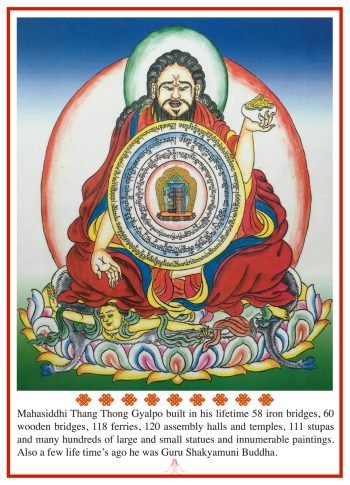
Thang Thong Gyalpo Earthquake Protection
In addition, the Foundation Store offers images of our teachers, including His Holiness the Dalai Lama, Lama Yeshe and Lama Zopa Rinpoche in Lawudo, Nepal, and Lama Zopa Rinpoche in Sarnath.
You can also find images of many deities and merit fields to support your practices. Here a few example of the deity images available:
- Medicine Buddha
- Twenty-one Taras
- Vajrasattva with Wisdom Mother
- Thirty-five Buddhas of Confession
- Nyung Na merit field
- Lama Chopa merit field
Other inspiring and beneficial images include the Meritorious Elephant Generating Power, Rinpoche’s Live with Compassion poster, and many more mantras, including several different Namgyama mantra images.
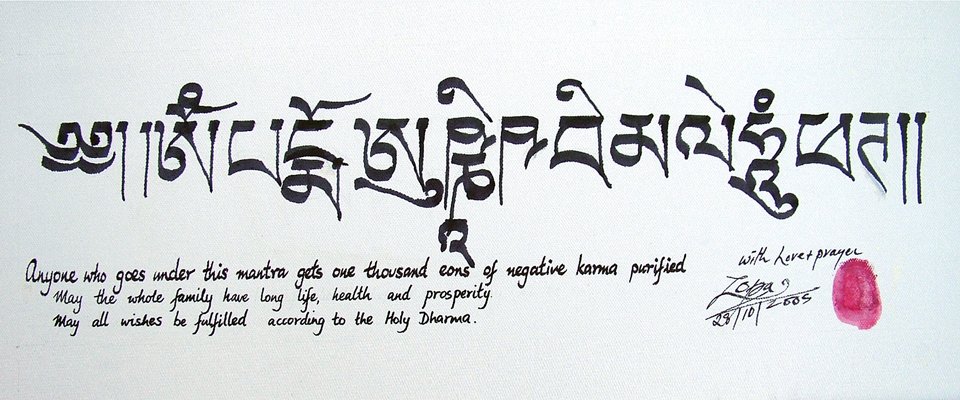
Door mantra by Lama Zopa Rinpoche
You can find more than fifty downloadable cards and posters at the Foundation Store:
https://shop.fpmt.org/Printable-Cards-Posters-_c_712.html
You can find a full catalogue of all FPMT prayers, practices, and advice materials on FPMT.org. If you have questions about copyright and distribution (digital and print) for Foundation Store materials, cards, and posters, please see Copyright Guidelines.
Through comprehensive study programs, practice materials, and training seminars, FPMT Education nourishes the development of compassion, wisdom, kindness, and true happiness in individuals of all ages.
18
Sutra and Dharani Resources for Your Dharma Practice
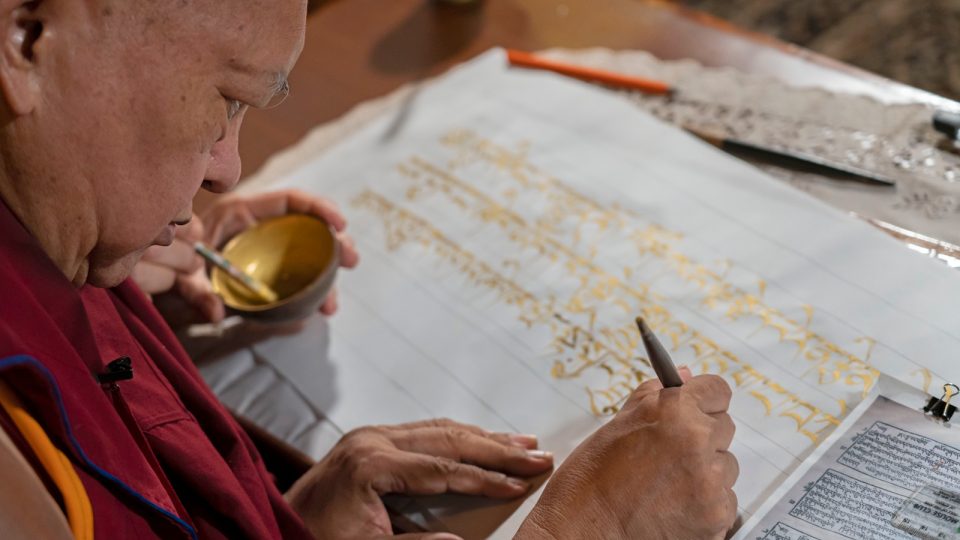
Lama Zopa Rinpoche writing the Prajnaparamita Sutra in gold, Kopan Monastery, Nepal, August 2021. Photo by Ven. Lobsang Sherab.
Sutras are records of teachings given by the historical Buddha, Shakyamuni. The Buddha’s discourses were memorized by his disciples and later written down in various languages, the most complete collections of teachings being in Pali and Sanskrit. Because sutras contain the actual words spoken by the Buddha, by reproducing that speech ourselves during recitations our voice becomes a conduit for the spread of Buddha’s teachings in the world. A special set of sutras called dharmaparyayas or “transformative teachings,” including the Sanghata Sutra, function to transform those who hear, recite, or write out them in particular ways, in the same way as meeting a buddha in the flesh.
Lama Zopa Rinpoche has offered advice on and oral transmission of many significant sutras so that FPMT students can include sutras in their Dharma practice, including reading, reciting, and writing specific sutras. FPMT.org offers a “Sutras & Dharanis” resource page that contains links to digital versions of these sutras for you to download. Some sutras have audio files so that you can listen to a sutra or play it for others, such as animals. In addition, many sutras have links to Rinpoche’s practice advice and commentary on the benefits of sutras.
Also on this resource page, you’ll find a collection of dharanis (Skt, dhāraṇī), or zung in Tibetan (Tib. gzungs), which has the connotation of “to hold or maintain.” Rinpoche explains that it can also mean the “unforgetting wisdom for abandoning nonvirtue and abiding in virtue.” A dharani usually consists of Sanskrit phrases and mantras, and can also be a short summary of the essential teaching contained in a much longer sutra text.
We invite you to explore this page and consider adding sutras and dharanis to your Dharma practice:
https://fpmt.org/education/prayers-and-practice-materials/sutras/
Through comprehensive study programs, practice materials, and training seminars, FPMT Education nourishes the development of compassion, wisdom, kindness, and true happiness in individuals of all ages.
11
FDCW is especially happy to share a welcome address from FDCW Patron His Holiness the Dalai Lama for this year’s conference. His Holiness emphasizes the importance of inner peace and cultivating a compassionate mind in his short video talk, which is introduced by Victoria Coleman, FDCW’s executive director.
Watch His Holiness the Dalai Lama’s Welcome Address
Taking place November 15–20, 2021, the Compassion and Wisdom in Action 2021 conference will have talks and workshops across four themes:
- Values—Exploring what guides us and what matters most
- Mind—Inquiring deeply into the latest science and ancient wisdom
- Healing—Nurturing hearts, bodies, and minds with compassion
- Engaged Action—Serving the world through wise and compassionate action
On the conference’s opening day, Alison Murdoch hosts a global conversation with Osel Hita. Other speakers include Ven. Robina Courtin, Ven. Tenzin Chogkyi, and Andy Wistreich. For the closing day, Lama Zopa Rinpoche, FDCW’s honorary president, is giving a specially recorded video message. Additional speakers over the six days come from a wide range of Universal Education projects. All are welcome to join the conferences sessions, which are offered free of charge.
FDCW’s programs are based on Universal Education for Compassion and Wisdom—a secular system of inner learning that cultivates and explores universal values such as humility, kindness, courage, compassion, and empathy. Universal Education for Compassion and Wisdom is one of FPMT’s Five Pillars of Service.
FPMT founder Lama Thubten Yeshe first shared his vision for Universal Education in the mid-1970s, and since then his unique and innovative approach has inspired many individuals as well as many projects in schools, universities, hospices, workplaces, healthcare, youth groups, and community centers around the world. In an interview in 1983, Lama Yeshe described his radical idea in more depth. He said, “We have to get rid of people’s old concepts and give them a new imagination; a new, broad way of looking at themselves and the world. That’s what I mean by ‘universal.'”
FDCW was established in 2005 and provides training, programs, and resources inspired by the values and vision of Universal Education. FDCW’s programs are grounded in Buddhist teachings and presented in secular language, using modern learning methods both online and in person. The focus is putting secular ethics into practice in everyday life. Over the years FDCW’s programs have reached many thousands of people through a dedicated and growing network of facilitators around the world.
You can find more information about Compassion and Wisdom in Action 2021 Conference, including individual talks as well as the registration links for the live sessions, in the conference planner on the FDCW website.
FPMT.org and Mandala Publications brings you news of Lama Zopa Rinpoche and of activities, teachings, and events from 150 FPMT centers, projects, and services around the globe. If you like what you read, consider becoming a Friend of FPMT, which supports our work.
- Tagged: foundation for developing compassion and wisdom, his holiness the dalai lama, uecw, universal education, universal education pillar
12
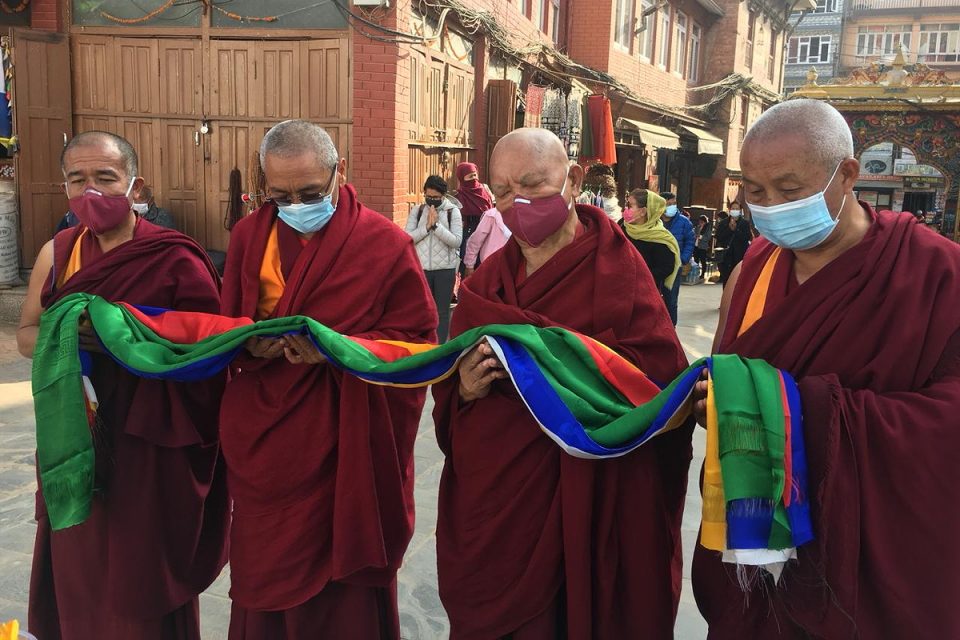
Losang Namgyal Rinpoche, Khen Rinpoche Geshe Chonyi, Lama Zopa Rinpoche, and Gen Tenpa Choden offering five color khatas to Boudha Stupa, Nepal, January 2021. Photo by Ven. Lhundrup Topgye.
Lhabab Duchen, one of the four great holy days of the Buddhist calendar, takes place this year on October 27.
Lhabab Duchen celebrates Guru Shakyamuni Buddha’s return to Earth from the God Realm of the Thirty-Three. That is where Buddha taught Dharma for several months to the gods, including his mother, Mayadevi, who had died a week after Buddha’s birth and been reborn there. As a merit multiplying day, the karmic results of actions done on this day are multiplied 100 million times. This amazing result is taught in the vinaya text Treasure of Quotations and Logic.
Specific practices recommended by Lama Zopa Rinpoche for these special days include:
- Taking the eight Mahayana precepts: students can receive the lineage of these precepts from a specially produced video of Lama Zopa Rinpoche granting them
- Reciting the Sutra Remembering the Three Jewels
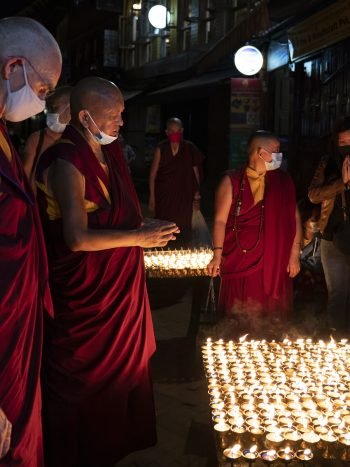
Lama Zopa Rinpoche making light offerings at Boudha Stupa, Nepal, September 2021. Photo by Ven. Lobsang Sherab.
A longer list of recommended practices can be found at “Practices for Merit Multiplying Days and Eclipses.” Of course, it is also good to do any of the other meritorious activities often advised by Lama Zopa Rinpoche on these great holy days. (Advice specifically for merit-multiplying days can also be found in French. You can also find Dharma practice materials in other languages.)
In accordance with the advice of Ven. Choden Rinpoche, one of Lama Zopa Rinpoche’s teachers, Lama Zopa Rinpoche observes all the auspicious dates in the Buddhist calendar by Indian Standard time, instead of any other local time.
Offerings on Lhabab Duchen
Every merit multiplying day, the Puja Fund sponsors a large number of pujas and practices performed by thousands of Sangha. During this Lhabab Duchen, the Puja Fund will offer on behalf of the entire FPMT organization and all students, benefactors, and beings:
- Recitation of the Prajnaparamita Sutra by Gyudmed Tantric College
- Recitations of the Golden Light Sutra, Arya Sanghata Sutra, Vajra Cutter Sutra, and Amitayus Long Life Sutra by thousands of Sangha at Sera Je, Sera Mey, Gaden Jangtse, Gaden Shartse, Drepung Gomang, and Loseling monasteries and Gyuto Tantric College
- Offerings to all of Lama Zopa Rinpoche’s gurus and to over 10,000 Sangha, including those in International Mahayana Institute Sangha communities
- Offerings of robes to the Shakyamuni Buddha statue in the Mahabodhi Temple in Bodhgaya, India, and saffron and umbrellas to the Boudhanath and Swayambunath stupas in Nepal
Let’s rejoice in all of the meritorious activities that will be happening in the FPMT and around the world on this auspicious merit-multiplying day!
Special thanks to the Liberation Prison Project for preparing a Tibetan calendar with information on holy days and other important dates.
Through comprehensive study programs, practice materials, and training seminars, FPMT Education nourishes the development of compassion, wisdom, kindness, and true happiness in individuals of all ages.
- Tagged: lhabab duchen, merit multiplying day
28
New Dharma Resources Available in the Foundation Store
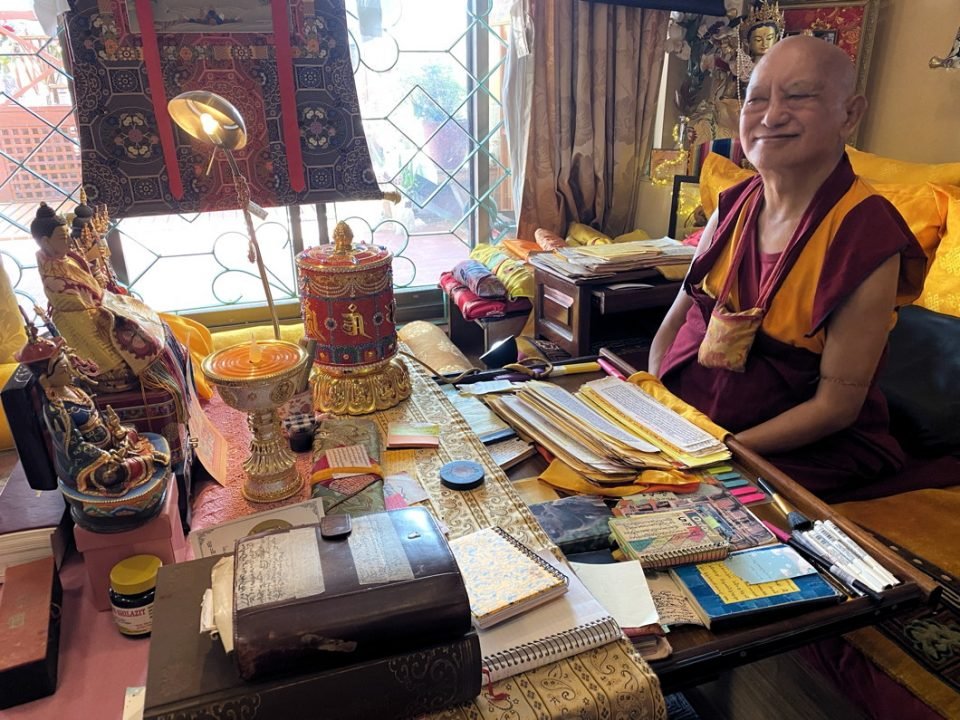
Lama Zopa Rinpoche with his texts at Kopan Monastery, Nepal, July 2021. Photo by Ven. Roger Kunsang.
The Foundation Store, now a fully digital online shop, continues to add new and updated materials that are freely available. Many of these new materials and updates, which are intended to support FPMT students in their practice of Dharma, were specifically requested by Lama Zopa Rinpoche. Here are some highlights:
Recently Added and Updated PDFs and eBooks
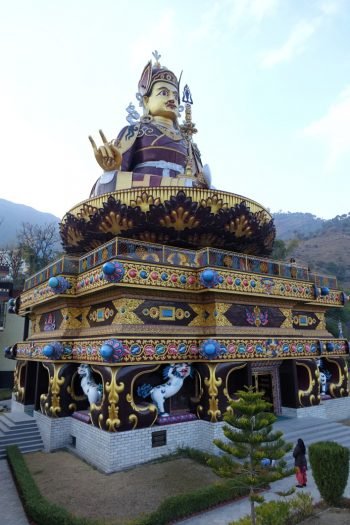
Padmasambhava statue in Tso Pema, India, 2016. Photo by Ven. Roger Kunsang.
The Benefits of Guru Padmasambhava Statues
The vast and far-reaching benefits that accrue from building statues of Padmasambhava (Guru Rinpoche) and making offerings are presented in this newly translated text.
The translation of this Tibetan composition, which belongs to Lama Zopa Rinpoche’s personal collection of Dharma texts, coincides with Rinpoche’s initiative to build a 60-foot (18-meter) tall statue of Padmasambhava at a special spot of blessing close to the Maratika Treasury Cave, where Padmasambhava and the wisdom mother, Princess Mandarava, accomplished immortality.
The All Pervasive Sphere of Great Bliss, Free of Elaboration: Requesting Activities of Palden Lhamo
This short prayer to the protector Palden Lhamo was written by His Holiness the Fourteenth Dalai Lama in 1973. The new translation into English by Ven. Tenzin Namjong was done at the request of Lama Zopa Rinpoche.
Dedication Prayers
This collection of dedication prayers is for use in FPMT centers and at events with Lama Zopa Rinpoche, as well as by students engaged in retreat who wish to follow Rinpoche’s way of doing extensive dedications. Audio recordings of many of these dedication prayers can be heard in the new Dedication Verses – MP3 Download.
Cultivating Mindfulness of Bodhicitta in Daily Activities
This booklet, translated and composed by Lama Zopa Rinpoche, shows us how to transform our everyday activities—such as sitting down, standing up, washing, and dressing—into causes for enlightenment by undertaking them with the bodhicitta motivation to benefit all sentient beings.
A Direct Meditation on All the Important Points of the Lamrim
This booklet contains Lama Zopa Rinpoche’s translation of a short lamrim prayer by Dorje Chang Lozang Jinpa. Rinpoche praises the prayer, saying “it is very, very good as a motivation for life.”
Long Life Prayers
This is a collection of long life prayers for His Holiness the Dalai Lama, Lama Zopa Rinpoche, and Tenzin Ösel Rinpoche. It includes Song of Immortality—the extensive long life prayer of His Holiness the Dalai Lama—and Remembering the Kindness of the Dalai Lama and the Tibetan People, composed by Lama Zopa Rinpoche, as well as the holy name mantras of His Holiness the Dalai Lama and Lama Zopa Rinpoche.
New Digital Audio Albums
Ritual for Taking the Eight Mahayana Precepts
This album contains the ceremony and commentary of the Ritual for Taking the Eight Mahayana Precepts compiled by Lama Zopa Rinpoche. Tracks include the actual ritual, the Mantra of Pure Morality, and the dedication verses from Shantideva’s Bodhicharyavatara, beautifully recited by Rinpoche.
Chenrezig Mantra
This recording shares Lama Zopa Rinpoche’s chanting of the Chenrezig Six-Syllable Mantra (Short Mantra), the Eleven-Faced Chenrezig Dharani (Chenrezig Long Mantra), and the Holy Name Mantra of Chenrezig (Chenrezig Longest Mantra). Bundled with the audio are several additional PDFs to support one’s mani mantra recitation practice.
Phagpa Chulung Rolpai Do Mantra
This audio recording features Lama Zopa Rinpoche reciting the Phagpa Chulung Rolpai Do mantra. In addition, Rinpoche offers a brief commentary on the mantra’s benefits, including purifying 100,000 eons of negative karma and obscurations.
Medicine Buddha Mantra
This audio recording features Lama Zopa Rinpoche reciting the short and long versions of the Medicine Buddha mantra and Vaidurya Light Dharani (Medicine Buddha Longest Mantra).
Find new items and more downloadable audio at the Foundation Store (shop.fpmt.org).
Through comprehensive study programs, practice materials, and training seminars, FPMT Education nourishes the development of compassion, wisdom, kindness, and true happiness in individuals of all ages.
- Tagged: audio, foundation store, padmasambhava statue, texts
16
Creating the Conditions for Success
Students regularly contact Lama Zopa Rinpoche and FPMT International Office with questions about business, money, and finding meaningful work. The FPMT Foundation Store has three new items that may help with these areas of concern:
The Celestial Mansion Extremely Secret Sublime Success Mantra
Lama Zopa Rinpoche said about the mantra:
“It is especially good to recite this mantra before going to see important people or participating in important meetings where you want the people present at the meeting to listen to you and do what you say. This mantra also can help for success in business and it brings wealth. In the text (from the Kangyur), it says to recite this mantra three times each day.
“Buddha taught such things because his omniscient mind knows what methods best fit each sentient being. Out of his great compassion, Buddha gave various mantras to help to remove the sufferings of sentient beings. He showed these various methods while showing the unmistaken path to become free from samsara and achieve liberation and the unmistaken path to achieve enlightenment.”
Verses for the Eight Noble Auspicious Ones – MP3 Download
The album Verses for the Eight Noble Auspicious Ones – MP3 Download features Lama Zopa Rinpoche’s oral transmission of the Verses for the Eight Noble Auspicious Ones and includes a PDF translation of it by Ven. Gyalten Lekden. This prayer is often recited to remove obstacles and create favorable circumstance for success.
Mipham Jamyang Namgyal Gyatso (1846–1912), also commonly known as Je Mipham, composed this inspiring prayer. Verses for the Eight Noble Auspicious Ones, or Tashi Gyepa in Tibetan, is one of his most well-known compositions and is recited daily by practitioners from a variety of different traditions. In these verses one pays homage to the Three Jewels, eight sugatas, the eight great bodhisattvas, the eight offering goddesses, and the eight worldly guardians. The text also describes the hand implements or offerings held by each of the eight bodhisattvas, goddesses and guardians.
The text invokes the auspiciousness of all these figures, and as mentioned by Mipham at the end of the text, its recitation, if done daily or especially before commencing new activities or projects, has inconceivable benefits. It removes obstacles, creates favorable circumstances and allows one to accomplish all of one’s desires. Lama Zopa Rinpoche has recommended reciting this prayer every morning for “the success of the center and your own success, the success of FPMT, and the holy wishes of His Holiness the Dalai Lama.”
More Advice from Rinpoche
Lama Zopa Rinpoche’s advice on these topics and more can be found in the “Lama Zopa Rinpoche’s Online Advice Book,” created by the Lama Yeshe Wisdom Archive. You can read advice on topics such as the following:
Find these items and more at the FPMT Foundation Store:
https://shop.fpmt.org/
Through comprehensive study programs, practice materials, and training seminars, FPMT Education nourishes the development of compassion, wisdom, kindness, and true happiness in individuals of all ages.
- Tagged: advice from lama zopa rinpoche, audio, celestial mansion extremely secret sublime success mantra, verses for the eight auspicious noble ones
8
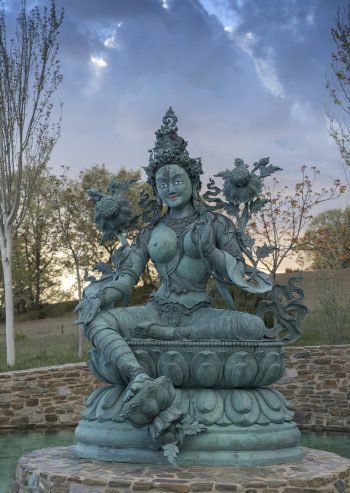
Tara statue at Osel Ling Centro de Retiros, Spain, 2019. Photo by Ven. Lobsang Sherab
The great Arya Tara is a female aspect of Buddha. She is known as “the liberator” and can help remove obstacles and speed progress on the path to enlightenment. For this reason, Tara practice is done by both lay students and highly realized beings alike.
Several new materials related to Tara practice have been made available on the Foundation Store this year.
The Names and Mantra of the Twenty-One Taras is a short practice, which includes the prayer Exceedingly Swift Blessing: A Praise to the Twenty-One Taras. A heart practice of the Indian pandits drawn from the Tengyur, Exceedingly Swift Blessings consists of a prayer of homage to the Twenty-One Taras by way of invoking their names, followed by the recitation of Tara mantra.
Lama Zopa Rinpoche translated the Abbreviated Praise to the Twenty-One Taras for FPMT students in 2019. This five-line verse was given to Lama Atisha by Arya Tara so that he could accomplish 10,000 recitations of the Praises to the Twenty-One Taras in one day in order to heal his body from sickness.
Rinpoche’s translation of the Abbreviated Praise can also be found in the 2021 update of the Praise to the Twenty-One Taras practice booklet and also in the recently published FPMT Essential Prayer Book.
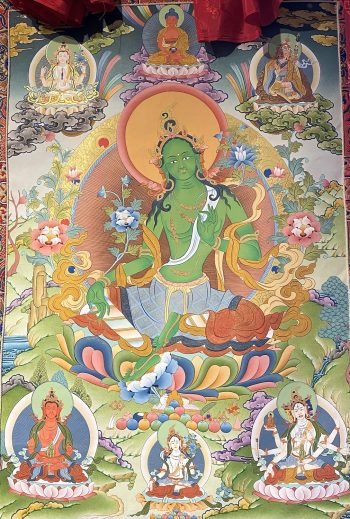
Tara thangka offered to Lama Zopa Rinpoche by Khadro-la, Kopan Monastery, July 2021. Photo by Ven. Roger Kunsang.
Students can download a new audio album by the same name, Praises to the Twenty-One Taras, to accompany its print edition. It features separate recordings of Lama Zopa Rinpoche and Kopan Monastery’s lama gyupas (tantric ritual monks) chanting in Tibetan and also includes a rendition of the verses chanted in English and Tibetan by FPMT teachers. It is bundled with the updated PDF and ebook versions of the text.
Lama Zopa Rinpoche’s key advice on the benefits and swift efficacy of doing Tara practice is collated in the article “Tara the Liberator,” available from the Lama Yeshe Wisdom Archive. Also noteworthy is that His Holiness the Dalai Lama highly recommends the chanting of the Tara mantra to counter the effects of the Covid-19 virus.
Find all practice materials related to Tara in the FPMT Foundation Store (shop.fpmt.org).
Through comprehensive study programs, practice materials, and training seminars, FPMT Education nourishes the development of compassion, wisdom, kindness, and true happiness in individuals of all ages.
- Tagged: 21 taras, tara practice
- Home
- News/Media
- Study & Practice
- About FPMT Education Services
- Latest News
- Programs
- New to Buddhism?
- Buddhist Mind Science: Activating Your Potential
- Heart Advice for Death and Dying
- Discovering Buddhism
- Living in the Path
- Exploring Buddhism
- FPMT Basic Program
- FPMT Masters Program
- FPMT In-Depth Meditation Training
- Maitripa College
- Lotsawa Rinchen Zangpo Translator Program
- Universal Education for Compassion & Wisdom
- Online Learning Center
- Prayers & Practice Materials
- Overview of Prayers & Practices
- Full Catalogue of Prayers & Practice Materials
- Explore Popular Topics
- Benefiting Animals
- Chenrezig Resources
- Death & Dying Resources
- Lama Chopa (Guru Puja)
- Lama Zopa Rinpoche: Compendium of Precious Instructions
- Lama Zopa Rinpoche: Life Practice Advice
- Lama Zopa Rinpoche Practice Series
- Lamrim Resources
- Mantras
- Prayer Book Updates
- Purification Practices
- Sutras
- Thought Transformation (Lojong)
- Audio Materials
- Dharma Dates – Tibetan Calendar
- Translation Services
- Publishing Services
- Teachings and Advice
- Find Teachings and Advice
- Lama Zopa Rinpoche Advice Page
- Lama Zopa Rinpoche: Compendium of Precious Instructions
- Lama Zopa Rinpoche Video Teachings
- ༧སྐྱབས་རྗེ་བཟོད་པ་རིན་པོ་ཆེ་མཆོག་ནས་སྩལ་བའི་བཀའ་སློབ་བརྙན་འཕྲིན།
- Podcasts
- Lama Yeshe Wisdom Archive
- Buddhism FAQ
- Dharma for Young People
- Resources on Holy Objects
- Ways to Offer Support
- Centers
- Affiliates Area
- Teachers
- Projects
- Charitable Projects
- Make a Donation
- Applying for Grants
- News about Projects
- Other Projects within FPMT
- Support International Office
- Projects Photo Galleries
- Give Where Most Needed
- FPMT
- Shop
Translate*
*powered by Google TranslateTranslation of pages on fpmt.org is performed by Google Translate, a third party service which FPMT has no control over. The service provides automated computer translations that are only an approximation of the websites' original content. The translations should not be considered exact and only used as a rough guide.Every second of this human life gives us the freedom to choose between hell and enlightenment, samsara and liberation.







